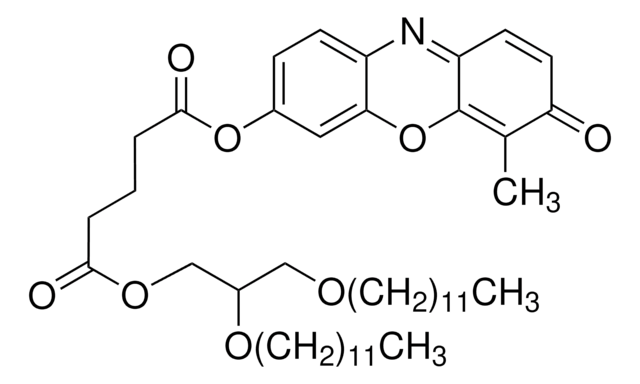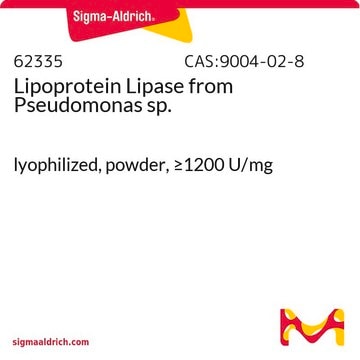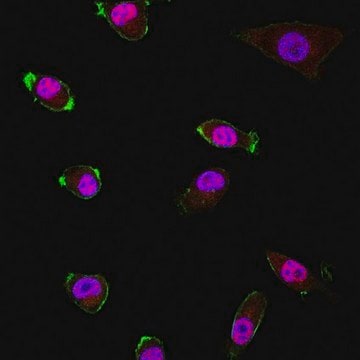MAK109
LPL Activity Assay Kit
Supplied by Roar Biomedical, Inc.
Synonym(s):
Lipoprotein lipase activity assay kit
Sign Into View Organizational & Contract Pricing
All Photos(2)
About This Item
UNSPSC Code:
12161503
NACRES:
NA.84
Recommended Products
usage
sufficient for 100 fluorometric tests
application(s)
pharmaceutical
detection method
fluorometric
relevant disease(s)
gastrointestinal diseases; cardiovascular diseases
storage temp.
2-8°C
Gene Information
human ... LPL(4023)
Related Categories
General description
Lipoprotein lipase (LPL) hydrolyzes triglycerides associated with VLDL.
Application
LPL Activity Assay Kit may be used for detection of LPL activity in plasma samples of patients with hypertriglyceridemia.
Suitability
Suitable for the measurement of lipoprotein lipase activity in a variety of tissue samples
Principle
The LPL Activity Assay Kit includes a non-fluorescent substrate emulsion that becomes intensely fluorescent upon interaction with LPL and pre-hydrolyzed substrate for use as a standard to convert the fluorescence intensity reading to moles of reactant formed (λEx=370 nm/λEm=450 nm). The assay is not specific for LPL and will also detect hepatic lipase activity.
related product
Product No.
Description
Pricing
Storage Class Code
10 - Combustible liquids
Certificates of Analysis (COA)
Search for Certificates of Analysis (COA) by entering the products Lot/Batch Number. Lot and Batch Numbers can be found on a product’s label following the words ‘Lot’ or ‘Batch’.
Already Own This Product?
Find documentation for the products that you have recently purchased in the Document Library.
Customers Also Viewed
Evemie Dubé et al.
Biology of reproduction, 87(1), 14-14 (2012-05-04)
Knowledge of the consequences of maternal obesity in human placental fatty acids (FA) transport and metabolism is limited. Animal studies suggest that placental uptake of maternal FA is altered by maternal overnutrition. We hypothesized that high maternal body mass index
Ewa Szalowska et al.
Peptides, 32(5), 938-945 (2011-02-22)
GIP receptor knockout mice were shown to be protected from the development of obesity on a high fat diet, suggesting a role of GIP in the development of obesity. In our study we aimed to test the hypothesis if excess
Tomomi Yamazaki et al.
Journal of lipid research, 53(10), 2024-2037 (2012-06-28)
Postprandial hyperlipidemia (lipemia) is a risk factor for atherosclerosis. However, mouse models of postprandial hyperlipidemia have not been reported. Here, we report that ddY mice display marked postprandial hypertriglyceridemia in response to dietary fat. In ddY mice, the fasting serum
Cedric H L Shackleton
Lipids, 47(1), 1-12 (2011-08-30)
In 1937 Butler and Marrian found large amounts of the steroid pregnanetriol in urine from a patient with the adrenogenital syndrome, a virilizing condition known to be caused by compromised adrenal secretion even in this pre-cortisol era. This introduced the
Hung-Yu Sun et al.
Gut, 62(8), 1193-1203 (2012-06-13)
Circulating hepatitis C virus (HCV) virions are associated with triglyceride-rich lipoproteins, including very low-density lipoprotein (VLDL) and low-density lipoprotein (LDL), designated as lipo-viro-particles (LVPs). Previous studies showed that lipoprotein lipase (LPL), a key enzyme for hydrolysing the triglyceride in VLDL
Protocols
Lipoprotein lipase (LPL) hydrolyzes triglycerides associated with VLDL.
Our team of scientists has experience in all areas of research including Life Science, Material Science, Chemical Synthesis, Chromatography, Analytical and many others.
Contact Technical Service












